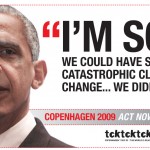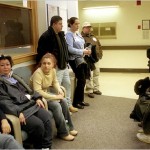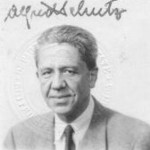 Between those late 19th century discussions of euthanasia as mercy killing and 1975, when Balfour Mount introduced the term palliative care, there was no name for supportive care of the dying. Without a name, there could be no specialists in the subject, no professors to teach it, no training for physicians. There was little discussion of the subject in medical schools. Without a name, the subject could not be indexed and researched in medical literature. There could be no advances in knowledge or improvement in techniques. Read more
Between those late 19th century discussions of euthanasia as mercy killing and 1975, when Balfour Mount introduced the term palliative care, there was no name for supportive care of the dying. Without a name, there could be no specialists in the subject, no professors to teach it, no training for physicians. There was little discussion of the subject in medical schools. Without a name, the subject could not be indexed and researched in medical literature. There could be no advances in knowledge or improvement in techniques. Read more
Physician as lone practitioner
 Bureaucratized shift-work is not good for doctors and it’s not good for patients. I don’t know what the solution will be. Primary care doctors are asking to be paid by the hour, not for piece work. That might help. The wealthy can afford concierge doctors. Maybe something will come out of the medical home concept. If doctors and patients get unhappy enough, perhaps a creative solution will evolve. Read more
Bureaucratized shift-work is not good for doctors and it’s not good for patients. I don’t know what the solution will be. Primary care doctors are asking to be paid by the hour, not for piece work. That might help. The wealthy can afford concierge doctors. Maybe something will come out of the medical home concept. If doctors and patients get unhappy enough, perhaps a creative solution will evolve. Read more
The tyranny of health
 A recent commentary in the Journal of the American Medical Association asks: If individuals don’t use preventive services, “what kind of penalty … would be ethically and morally acceptable?” The question wasn’t “How do we account for unhealthy behavior,” but what punishment would be sufficient either to change that behavior or at least to save money by denying these people health care. Read more
A recent commentary in the Journal of the American Medical Association asks: If individuals don’t use preventive services, “what kind of penalty … would be ethically and morally acceptable?” The question wasn’t “How do we account for unhealthy behavior,” but what punishment would be sufficient either to change that behavior or at least to save money by denying these people health care. Read more
Blogging: Time to get over it
 When political and economic thinking became more conservative in the 1970s and 1980s, governments began to promote the idea that individuals were personally responsible for their health and should practice healthy lifestyles. A large segment of the population – mainly the educated and economically secure – welcomed these ideas. Feeling personally responsible for one’s health and practicing healthy lifestyles gives one the reassuring illusion of control. In particular, it’s a good distraction from the things that are beyond individual control, like salmonella in our peanut butter and the superbug MRSA at the gym. Read more
When political and economic thinking became more conservative in the 1970s and 1980s, governments began to promote the idea that individuals were personally responsible for their health and should practice healthy lifestyles. A large segment of the population – mainly the educated and economically secure – welcomed these ideas. Feeling personally responsible for one’s health and practicing healthy lifestyles gives one the reassuring illusion of control. In particular, it’s a good distraction from the things that are beyond individual control, like salmonella in our peanut butter and the superbug MRSA at the gym. Read more
The end of privacy
 Some argue that social networking, and the web in general, encourages us to merge our identities – to no longer have separate selves for home, office, leisure, and friends. As the author points out, however, “a humane society values privacy, because it allows people to cultivate different aspects of their personalities in different contexts.” Read more
Some argue that social networking, and the web in general, encourages us to merge our identities – to no longer have separate selves for home, office, leisure, and friends. As the author points out, however, “a humane society values privacy, because it allows people to cultivate different aspects of their personalities in different contexts.” Read more
Prescription drug abuse and the Osbournes
 I remember a scene from The Osbournes where son Jack, recently released from drug rehab, talks about finding a few stray particles of OxyContin dust in his pocket. He immediately consumed them as if his life depended on it. The craving was overwhelming. His description made the feeling of addiction palpable. Read more
I remember a scene from The Osbournes where son Jack, recently released from drug rehab, talks about finding a few stray particles of OxyContin dust in his pocket. He immediately consumed them as if his life depended on it. The craving was overwhelming. His description made the feeling of addiction palpable. Read more
Tony Judt — continued
 “Why is it that here in the United States we have such difficulty even imagining a different sort of society from the one whose dysfunctions and inequalities trouble us so?” he asked from his wheelchair. Read more
“Why is it that here in the United States we have such difficulty even imagining a different sort of society from the one whose dysfunctions and inequalities trouble us so?” he asked from his wheelchair. Read more
I am saddened by the death of Tony Judt
 The vocal muscle, for sixty years my reliable alter ego, is failing. Communication, performance, assertion: these are now my weakest assets. Translating being into thought, thought into words, and words into communication will soon be beyond me and I shall be confined to the rhetorical landscape of my interior reflections. Read more
The vocal muscle, for sixty years my reliable alter ego, is failing. Communication, performance, assertion: these are now my weakest assets. Translating being into thought, thought into words, and words into communication will soon be beyond me and I shall be confined to the rhetorical landscape of my interior reflections. Read more
Check out this medical blog
 I have a post today at the blog KevinMD. … “An exemplary blog that features timely news and opinion of the latest in medicine, bringing in one of the most devoted audiences and keeping thousands of curious minds satisfied with smart and funny writing. While working on his own blog, Kevin has consistently promoted the rest of the medical blogosphere as a useful and reliable source for medical knowledge and opinion.” Read more
I have a post today at the blog KevinMD. … “An exemplary blog that features timely news and opinion of the latest in medicine, bringing in one of the most devoted audiences and keeping thousands of curious minds satisfied with smart and funny writing. While working on his own blog, Kevin has consistently promoted the rest of the medical blogosphere as a useful and reliable source for medical knowledge and opinion.” Read more
The end of the American dream?
 The future I most fear for America is Latin American: a grossly unequal society that is prone to wild swings from populism to orthodoxy, which makes sensible government increasingly hard to imagine. Look at the Tea Party. People think it came from nowhere. While I don’t agree with their remedies, most Tea Party members are middle-class Americans who have been suffering silently for years. Read more
The future I most fear for America is Latin American: a grossly unequal society that is prone to wild swings from populism to orthodoxy, which makes sensible government increasingly hard to imagine. Look at the Tea Party. People think it came from nowhere. While I don’t agree with their remedies, most Tea Party members are middle-class Americans who have been suffering silently for years. Read more
Should I stop taking calcium?
 We live in a very anxiety-producing culture. It’s not the inevitability of death that makes us so anxious. That’s a historical constant. It’s not simply the specifics of turmoil and suffering in the world. Nor is it the underlying insecurity we feel as side-effects of the transition to a global economy. All of those contribute to anxiety, yes. But what exacerbates our condition, in my opinion, is constant exposure to information that ultimately stands to benefit financially from maintaining a state of anxiety. That’s not a good situation. Read more
We live in a very anxiety-producing culture. It’s not the inevitability of death that makes us so anxious. That’s a historical constant. It’s not simply the specifics of turmoil and suffering in the world. Nor is it the underlying insecurity we feel as side-effects of the transition to a global economy. All of those contribute to anxiety, yes. But what exacerbates our condition, in my opinion, is constant exposure to information that ultimately stands to benefit financially from maintaining a state of anxiety. That’s not a good situation. Read more
Afghan women empowered to practice beauty
 The preoccupation with female appearance encourages evaluation of women in terms of sexual attractiveness rather than character, competence, hard-work, or achievement. Although some women benefit from their beauty, it is not a stable form of self-esteem. Read more
The preoccupation with female appearance encourages evaluation of women in terms of sexual attractiveness rather than character, competence, hard-work, or achievement. Although some women benefit from their beauty, it is not a stable form of self-esteem. Read more
Bibi Aisha: Fixing what can be fixed
 I noted that my judgmental reaction to another’s body was shaped by my coincidental assessment that surgeons work on conditions like that. Judgment conflates the body itself with the quality of work done on that body or the potential to have that work done. The possibility of fixing renders inescapable the question of whether or not to fix. Read more
I noted that my judgmental reaction to another’s body was shaped by my coincidental assessment that surgeons work on conditions like that. Judgment conflates the body itself with the quality of work done on that body or the potential to have that work done. The possibility of fixing renders inescapable the question of whether or not to fix. Read more
Mutilated Afghan woman on the cover of Time
 [T]here is an elision here between these women’s oppression and what the U.S. military presence can and should do about it, which in turn simplifies the complexities of the debate and turns it into, “Well, do you want to help Aisha or not?” Read more
[T]here is an elision here between these women’s oppression and what the U.S. military presence can and should do about it, which in turn simplifies the complexities of the debate and turns it into, “Well, do you want to help Aisha or not?” Read more
Bullying, education, and compassion

Radical changes are occurring in what democratic societies teach the young, and these changes have not been well thought through. Thirsty for national profit, nations, and their systems of education, are heedlessly discarding skills that are needed to keep democracies alive. If this trend continues, nations all over the world will soon be producing generations of useful machines, rather than complete citizens who can think for themselves, criticize tradition, and understand the significance of another person’s sufferings and achievements. Read more
Climate change and mass migration
 Few actual environmentalists want anything to do with these [right-wing] parties, and there doesn’t seem to be anything comparable in the United States, though if global warming does put pressure on immigration, it’s certainly possible that green nativists could find a toehold here. Read more
Few actual environmentalists want anything to do with these [right-wing] parties, and there doesn’t seem to be anything comparable in the United States, though if global warming does put pressure on immigration, it’s certainly possible that green nativists could find a toehold here. Read more
Atul Gawande: Modern death and dying
 [O]ur responsibility, in medicine, is to deal with human beings as they are. People die only once. They have no experience to draw upon. They need doctors and nurses who are willing to have the hard discussions and say what they have seen, who will help people prepare for what is to come—and to escape a warehoused oblivion that few really want. Read more
[O]ur responsibility, in medicine, is to deal with human beings as they are. People die only once. They have no experience to draw upon. They need doctors and nurses who are willing to have the hard discussions and say what they have seen, who will help people prepare for what is to come—and to escape a warehoused oblivion that few really want. Read more
Suicide among veterans is an “absolute crisis”
 Considering the two wars were declared and waged with scant attention to their full costs, lawmakers add insult to injury by invoking budget concerns for the traumatic needs of actual warriors.
Considering the two wars were declared and waged with scant attention to their full costs, lawmakers add insult to injury by invoking budget concerns for the traumatic needs of actual warriors.
… “The real question is, why don’t we care anymore?” Read more
A financial expert argues: Global warming is real
 Why are we arguing the issue? Challenging vested interests as powerful as the oil and coal lobbies was never going to be easy. Scientists are not naturally aggressive defenders of arguments. In short, they are conservatives by training: never, ever risk overstating your ideas. The skeptics are far, far more determined and expert propagandists to boot. They are also well-funded. That smoking caused cancer was obfuscated deliberately and effectively for 20 years at a cost of hundreds of thousands of extra deaths. We know that for certain now, yet those who caused this fatal delay have never been held accountable. The profits of the oil and coal industry make tobacco’s resources look like a rounding error. Read more
Why are we arguing the issue? Challenging vested interests as powerful as the oil and coal lobbies was never going to be easy. Scientists are not naturally aggressive defenders of arguments. In short, they are conservatives by training: never, ever risk overstating your ideas. The skeptics are far, far more determined and expert propagandists to boot. They are also well-funded. That smoking caused cancer was obfuscated deliberately and effectively for 20 years at a cost of hundreds of thousands of extra deaths. We know that for certain now, yet those who caused this fatal delay have never been held accountable. The profits of the oil and coal industry make tobacco’s resources look like a rounding error. Read more
Obama appoints Berwick to head CMS
 The obstetrician–gynecologist opposes one of the fundamental assumptions of the new health care law – that physicians should be paid according to the quality of their work, not the quantity. How can you argue against the quality of health care? Burgess spoke on the subject at a recent Health Affairs Media Breakfast:
The obstetrician–gynecologist opposes one of the fundamental assumptions of the new health care law – that physicians should be paid according to the quality of their work, not the quantity. How can you argue against the quality of health care? Burgess spoke on the subject at a recent Health Affairs Media Breakfast:
Burgess came to the defense of the current fee-for-service [FFS] system where the provider is paid for each individual service rendered to a patient. The congressman argued that doctors are “so goal directed that we need that impetus” of FFS as motivation to provide the best possible care. Read more
The earth’s scars
 Try to Praise the Multilated World
Try to Praise the Multilated World
You should praise the mutilated world.
Remember the moments when we were together
in a white room and the curtain fluttered.
Return in thought to the concert where music flared.
Read more
Links of interest: Can honey combat MRSA?
 The researchers are hopeful that they can build on these initial findings to develop new uses for this potent ingredient in honey, and in light of an alarming trend of antibiotic-resistance, ultimately even put defensin-1 to use as an alternative to current antibiotics. Read more
The researchers are hopeful that they can build on these initial findings to develop new uses for this potent ingredient in honey, and in light of an alarming trend of antibiotic-resistance, ultimately even put defensin-1 to use as an alternative to current antibiotics. Read more
The physician as humanist
 In 1980 the historian G.S. Rousseau expressed concern that modern physicians no longer embodied the humanist tradition of their predecessors. Now that medicine had become overwhelmingly a science rather than an art, he claimed, the interests and accomplishments of physicians had narrowed.
In 1980 the historian G.S. Rousseau expressed concern that modern physicians no longer embodied the humanist tradition of their predecessors. Now that medicine had become overwhelmingly a science rather than an art, he claimed, the interests and accomplishments of physicians had narrowed.
It was not uncommon, for Victorian and Edwardian doctors … to write prolifically throughout their careers. … In twentieth-century America … only the most imaginative physicians can hope for this artistic lifestyle as a consequence of the economic constraints and housekeeping demands placed upon the doctor. Read more
The physician as reader of poetry
 Why My Wife Should Let Me Have a Dog
Why My Wife Should Let Me Have a Dog
If I had a dog his soft fur would not foliate
the sofa or trigger asthma attacks
in my dear wife, ending with a hospital trip,
an adrenaline shot and those inhaler tubes
littering the house. Read more
The physician as poet
because there is this innocent animal,
the body;
because a baby’s unguarded gaze,
and the open regard
of animals both hold patience
with the world,
with mineral fact. Impenetrable
consciousness
arising from, locked into flesh. Read more
The indignity of the waiting room
 I gathered from conversations among those of us waiting that one man had been sitting in reception since 7 am. Well into his 70s, he was clearly nervous, biting his lower lip and muttering silently to himself. Occasionally, he pulled his appointment letter from his bag to double-check the instructions. He walked to the reception desk to ask what had happened. The same careless shrug, with another, “Just take a seat and they’ll call you”. Unable to see a way through this wall of unhelpfulness, he did as he was told. Eventually, he asked a passing nurse for help. She listened and looked him in the eye. But she said that sorry, she could not assist him. He must wait. Read more
I gathered from conversations among those of us waiting that one man had been sitting in reception since 7 am. Well into his 70s, he was clearly nervous, biting his lower lip and muttering silently to himself. Occasionally, he pulled his appointment letter from his bag to double-check the instructions. He walked to the reception desk to ask what had happened. The same careless shrug, with another, “Just take a seat and they’ll call you”. Unable to see a way through this wall of unhelpfulness, he did as he was told. Eventually, he asked a passing nurse for help. She listened and looked him in the eye. But she said that sorry, she could not assist him. He must wait. Read more
Negative knowledge: Remembering Alfred Schutz
 In practice there’s no reason to suspect that any particular piece of information is inadequate before it is revealed to be otherwise. But in theory there’s no reason to exclude anything from suspicion. It is characteristic of all interpretations, meanings, and values that they are never the last word. They are all potentially obsolete. Reality is not just occasionally precarious – it has no permanent foundations whatsoever. It is the nature of knowledge to be fragmentary and partial. This is the first and final, the ultimate source of anxiety.
In practice there’s no reason to suspect that any particular piece of information is inadequate before it is revealed to be otherwise. But in theory there’s no reason to exclude anything from suspicion. It is characteristic of all interpretations, meanings, and values that they are never the last word. They are all potentially obsolete. Reality is not just occasionally precarious – it has no permanent foundations whatsoever. It is the nature of knowledge to be fragmentary and partial. This is the first and final, the ultimate source of anxiety.
Read more
Cultural differences: Emoticons
![]() And what’s the significance of the need to tilt your head to read western QWERTY emoticons, but the eastern ones are looking straight at you? Not what I’d expect culturally. But perhaps the difference here is that the western versions require fewer keystrokes – we’re in more of a hurry.
And what’s the significance of the need to tilt your head to read western QWERTY emoticons, but the eastern ones are looking straight at you? Not what I’d expect culturally. But perhaps the difference here is that the western versions require fewer keystrokes – we’re in more of a hurry.
The Geographic points out that emoticons date back to 1881, when the American magazine Puck published “Typographical Art” for melancholy, indifference, astonishment, and joy. Emotions a bit more subtle than the ubiquitous smiley face, no? Read more
The essential foreignness of another culture
 Look at Korea, he writes. They’ve come around to Western economic ways. They’ve even adopted Western religions. Why does Japan insist on remaining distinctly different? Let’s face it. Western culture is going to dominate the world, and if the Japanese aren’t willing to give up their quaint and antiquated culture, they’ll have no one to blame but themselves.
Look at Korea, he writes. They’ve come around to Western economic ways. They’ve even adopted Western religions. Why does Japan insist on remaining distinctly different? Let’s face it. Western culture is going to dominate the world, and if the Japanese aren’t willing to give up their quaint and antiquated culture, they’ll have no one to blame but themselves.
This strikes me as disrespectful, insulting, and unenlightened. Read more
Having wounded the earth, we watch as she bleeds out
 The gush of filth is a reminder that we have surrendered our independence to a technology we cannot master. … The challenge goes beyond oil slicks and moral revulsion. In the bigger picture, big oil has no long-term future: sooner or later the contemptible little sheikdoms that have arisen upon a pool of liquid greed will sink back into the desert. But why should BP and the emirs script the endgame? Read more
The gush of filth is a reminder that we have surrendered our independence to a technology we cannot master. … The challenge goes beyond oil slicks and moral revulsion. In the bigger picture, big oil has no long-term future: sooner or later the contemptible little sheikdoms that have arisen upon a pool of liquid greed will sink back into the desert. But why should BP and the emirs script the endgame? Read more


